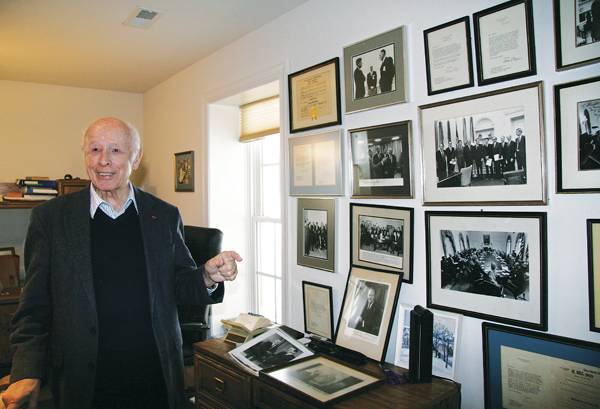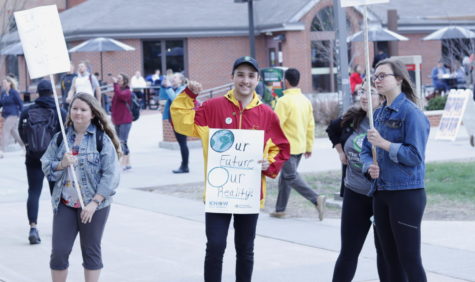Ink maintains ISU relationship

Dwight Ink stands in front of his collection of presidential memorabilia donning the walls of his basement in Lansdowne, Va. Ink served seven presidents, beginning with Dwight Eisenhower and ending with Ronald Reagan. Photo: Sarah Haas/Iowa State Daily
March 25, 2010
Dwight Ink had almost abandoned his goal of attending Iowa State when his parents surprised him with the $100 needed for tuition and books.
“My parents, unbeknownst to me, hocked my mother’s ISU fraternity pin, with which he had ‘pinned’ my mother,” Ink said.
Ink went on to graduate from college and graduate school and had a uniquely successful career serving seven presidents, ranging from President Dwight Eisenhower to President Ronald Reagan.
“His success conveys to me that he is the consummate bureaucrat because of his ability to deal with a variety of issues,” said James McCormick, chair and professor of political science.
Yet Ink never forgot his humble roots, which are firmly planted on Brush Ridge, in Madison County. His father graduated from Iowa State with a degree in horticulture and began harvesting apples. The young orchard was tested by a series of droughts during the Great Depression, the first of which occurred in 1931.
“The Great Depression — and it was a great depression — seriously affected everyone in our community,” Ink said. “Several of our neighbors committed suicide because of the depression.”
The Ink family’s neighbors accepted government food relief, but Ink’s father would not.
“Once he stood in the bread line and was so humiliated he vowed never to do it again,” Ink said. “It’s one thing to go hungry, and it was another thing to starve, and I don’t think he would have turned down help if we were starving.”
Instead, Ink’s father accepted relief for the family’s cow and a couple of chickens. The family subsisted on turnips they pulled and the generosity of neighbors.
“We were the poorest of the poor,” he said.
Despite Ink’s bleak financial situation, he was able to enroll at Iowa State in 1940. He raised turkeys so he could afford a pair of pants and a couple of dress shirts so he could “appear respectable.” Upon arriving in Ames, he quickly obtained a job as a custodian at Beardshear Hall and helped prune the college orchard.
He describes himself as an unexceptional student who was far more interested in extra curricular activities than lectures. His one room country school hadn’t prepared Ink for academics at Iowa State.
“I had to take algebra twice, and I think I took trigonometry twice, too,” Ink said. His literature and history grades, however, were impressive, which gave Ink a chance to redeem himself.
Ink busied himself with a gamut of activities, including writing staff editorials for the Iowa State Daily, which was called the Iowa State Daily Student and included a section specifically for women.
He also joined the War Council, which helped to educate students about World War II and to provide support for servicemen on and off campus. He also became president of the debaters, which allowed Ink to interact with some of the top political minds in the country. He was given an office in Beardshear, which Ink said was unique.
On Dec. 7, 1941, however, a message interrupted a movie Ink was attending — Pearl Harbor had been bombed.
“Early the next morning, I hitchhiked down to Des Moines to register for the army. There was one other person ahead of me. He turned out to be my father,” Ink said. “I don’t know who was the most surprised, but we couldn’t both go in the army, because someone had to take care of the orchard and my mother.”
He persuaded his father not to join the army, while Dwight promised his father that he would not enlist until he was drafted.
Ink was drafted the next fall and served four years with the U.S. Army Air Corps. Although he did not serve overseas, he was a flight tester for planes designed to land on the sandy beaches of France. He also received training as a combat engineer and worked as a military police officer in the Midwest.
He returned to Iowa State in 1946 and continued to organize debates with top leaders, including former Vice President Henry Wallace. The debate was set to take place in the old football stadium, but Wallace cancelled after he was fired by President Harry Truman from the position of Secretary of Commerce.
“It instilled in me an attitude that I could do a little more than I really could, which Iowa State fostered, because no college in the country had ever organized debate teams like we did,” Ink said. “It gave me confidence in attacking problems and meeting challenges that were normally considered impossible.”
Ink also had a new sense of direction.
“When I went into the army, I had no idea what I wanted to do with my life, but I had a lot of time to think in the Army, and by the time I came out I knew I wanted to get into public service,” Ink said.
After some investigation, Ink learned he could not obtain a degree at Iowa State that would allow him to be admitted into a public administration masters program. He enlisted the help of ISU President Charles Friley’s daughter, Frances Foreman, to encourage her father to expedite the process to adopt a new degree, which was a combination of history and government. The degree Ink received in 1948 was the precursor to the political science degree. The administrators and faculty compressed the normal process of establishing a new degree program into a few months.
“Without that extra curricular work at Iowa State, I never would’ve had enough leverage to become well enough known to the faculty to have been able to persuade them to adopt a degree that quickly,” Ink said.
Since leaving Iowa State, he has remained heavily invested in the university’s well being, even working with administrators to establish a scholarship fund for graduate students in public administration. The funds are meant to serve as an incentive for students “to engage in practical research.”
“There is often a tendency for university research in our field to be so theoretical it is of little value or use to a public service career or to Iowa State and local governments,” Ink said.
Provost Elizabeth Hoffman said she worked closely with Ink when he established the scholarship fund.
“He didn’t think the public administration program was being taken care of well,” Hoffman said. “He is deeply passionate about public service and has been behind a movement to educate people how to be public managers.”
Ink said he is grateful to have such a deep connection with Iowa State, which began when his great grandfather supported the founding of Iowa State College. His grandfather was one of the first to try Iowa State agricultural innovations, and his father was “the most partisan, enthusiastic rooter for the Cyclones one could imagine.”
“I give a lot of credit to Iowa State,” Ink said. “One, for not flunking me out when I probably should have been, but, secondly, for providing me all sorts of opportunities and an environment where you can become prepared for what comes next.”
















